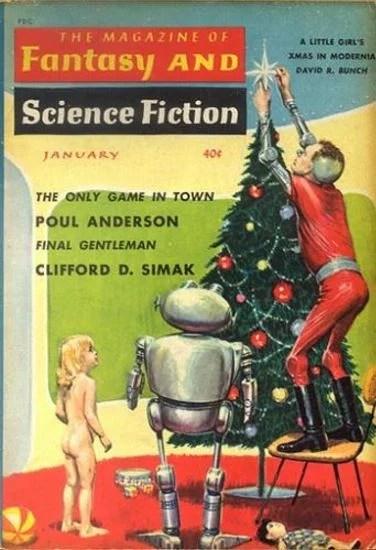
I've said before that I like my reading to be light and pleasant. Not exclusively, mind you, but I find the current trend toward the depressing to be… well… depressing. This month's F&SF is the bleakest I've yet encountered, and under normal circumstances, it would not have been to my taste. On the other hand, being near Hiroshima on August 6 and then near Nagasaki on August 9, fifteen years after they became testing grounds for a terrible new weapon, is enough to put even the cheeriest of persons into a somber mood, and my choice of reading material proved to be quite complementary.
As usual, I lack the rights to distribute F&SF stories, so you'll just have to buy the mag if you want the full scoop, but I'll do my best to describe the stories in detail.
Poul Anderson starts things off with the The Word to Space. In this novelette, Project OZMA, humanity's first concerted effort to scan the stars for communications broadcasts, bears almost immediate fruit, discovering a star with intelligent life just 25 light years away. Unfortunately, the focus of these aliens is proselytizing their strange religion, and with dialogue between planets essentially impossible, a century goes by with Earth learning frustratingly little about its cosmic neighbor. In the end, the alien theocracy is toppled when humanity requests clarification on some of the finer points of their creed; they just aren't equipped to handle religious debate. It's too bad none of the aliens were Jewish–we love quibbling over religious details.
Then we have A Day in the Suburbs, a delightfully barbed tale by Evelyn Smith about what housewives really have to deal with when their husbands go to work. The feuds between the "flat-roofs" and the "peaked-roofs" make the squabbles of the Jets and the Sharks seem like a square dance. It's a wonder any of them come out alive.
Burton Raffel's Goodbye is the first of the truly dark stories, in which a young ad exec is waylaid, imprisoned, and tortured, all to prove the efficacy of a five-day identity-removal process. The tale is disturbingly personal, and there is never any explanation as to why this is being done or why the protagonist was chosen (he is apparently not the first, and he surely won't be the last). Awful stuff… but then, it was meant to be.
Button, Button, by Gordon Dickson, seems almost out of place in this issue. It's a straightforward story about a crude-mouthed boss of a space freight union, and the beautiful, fiery opera singer he rescues halfway between Earth and Venus. Enjoyable, but it won't stay with you.
Reginald Bretnor offers up The Man on Top, about a stubborn mountaineer who, through sheer determination, makes it to the summit of one of the world's tallest mountains… only to find that someone has beaten him to the punch. Mysticism: 1; British pluck: 0.
Isaac Asimov has a sequel, of sorts, to his article on pi. This one is on the impossibility of "squaring the circle," which is the creation of a square with the same area of a given circle using only a straight-edge and a compass. I'm glad the good doctor wrote this piece since it's a topic about which I've always been interested.
On to Damon Knight's acerbic review of Walden Two. It is, apparently, the last F&SF will see from Mr. Knight–per the editor, he will no longer be reviewing books for the magazine. I hear, through the grapevine, that it is because Editor Robert Mills disapproved of Knight's justifiably savage critique of Judy Merril's latest book, The Tomorrow People.
Returning to fiction, we have George Elliot's The NRACP (The National Relocation Authority: Colored Persons). If you find Goodbye to be dark, NRACP is midnight coated in pitch. It is the portrayal of the systematic extermination of a people, from the point of view of one who has an indirect role in its execution. I was not surprised to find that this story was originally written in 1949, when the Holocaust was still a fresh wound on the human psyche, and the existence of Israel, a refuge for those who escaped the gas chambers, was still in doubt. For anyone who wonders how such a tragedy could occur in a civilized country, I suggest giving this tale a read.
That brings us to Kit Reed's somehow unfinished-feeling Two in Homage, about an evil, human-sacrifice demanding God , upon whom the tables are ultimately turned. I really should try to meet Ms. Reed someday. We do live in the same town, after all.
Wrapping up the issue is Joseph Whitehill's Doctor Royker's Experiment. How best to dissuade an idealist who feels science and scientists can do no wrong? Why, make him the butt of a scientist's prank, of course. Resentment cools even the strongest ardor.
Editor Mills saves his column for last. In it, he asks of if we readers prefer magazines to include stories all of a type or if we prefer a greater variegation of themes. Regardless of what we think, I gather from reading between Mills' lines that he prints what he gets, and the wave of unhappy tales is largely out of his (and our) control. I was able to take it this time. Here's hoping it doesn't become F&SF's signature trait.

And for those following my travels, I am currently at Tokyo's busy international airport awaiting my turn to board a sleek new Japan Air Lines DC-8 bound for home. It's been a great trip, but I'm ready to return to familiar surroundings. I imagine I've a huge pile of mail from my fans accumulated (and by fans, I mean advertisers and bill-collectors).
Stay tuned!



